
The Scoliidae, the scoliid wasps, are a family of wasps comprising about 560 species worldwide. They tend to be black, often marked with yellow or orange, and their wing tips are distinctively corrugated. Males are more slender and elongated than females, with significantly longer antennae, but the sexual dimorphism is not as apparent as in many of the Tiphiidae and Thynnidae.

Darkling beetle is the common name for members of the beetle family Tenebrionidae, comprising over 20,000 species in a cosmopolitan distribution.
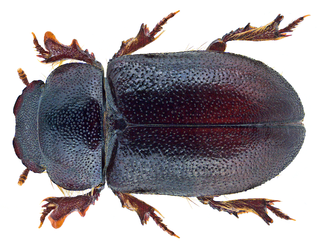
Cheirodes is a genus of darkling beetles in the Melanimonini tribe. It was formerly known as Anemia until 1973, when T. J. Spilman determined Anemia to be a synonym of CheirodesGéné, 1839.

Cossyphus is a genus of darkling beetles in the family Tenebrionidae. They occur in Eurasia and Africa.
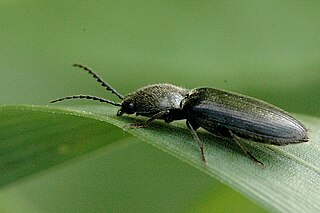
Agriotes is a genus of beetles in the family Elateridae which includes numerous species, many of which are found in the Americas, Asia and much of Europe.

Cerocoma is a Palearctic genus of blister beetle, whose biology is poorly known. As in other members of the family, these insects are hypermetamorphic. Larval hosts of few species were described. Imagines show distinct sexual dimorphism in the feeding apparatus and the antennae. All species in this genus have aposematic colouration.

Gonocephalum is a genus of darkling beetles in the family Tenebrionidae.
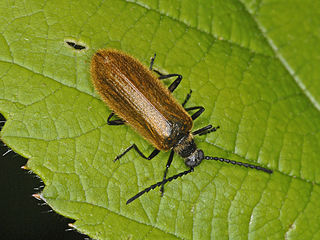
Lagria is a genus of beetles in the family Tenebrionidae.

Phaleria is a genus of darkling beetles belonging to the family Tenebrionidae.

Sphodrus leucophthalmus is a species of ground beetle native to Europe.Západopalearktický,stenotermní druh Tribu Sphodrini,žijící prvotně v hnízdech větších savců;např.jezevec,liška,.druhotně ve starých sklepích,stájích,komorách a jiných vlhkých prostorách s hliněnou podlahou.Jako potravu upřednostňuje brouky z čeledi tenebrionidae ,a jejich larvy.Velikost dosti kolísá,od 23 do 40 mm.Tento druh byl v minulosti celkem obvyklý,avšak rapidním úbytkem jeho druhotných biotopů,a skrytým způsobem života v prvotních hnízdech savců,se stal velmi vzácným,až téměř vymírajícím elementem.Imaga ponejvíce na podzim,/září ,říjen/.Vzhledem ke skrytému způsobu života je záměna možná s druhy rodu Laemostenus/Pristonychus/, případně s Dolichus halensis/,carabidae:Platynini/,nebo s Pterostichus niger/carabidae:Pterostichini/. Western palearctic, stenothermal species of the tribe Sphodrini, living primarily in the nests of larger mammals; e.g. badger, fox, secondarily in old cellars, stables, chambers and other damp spaces with a clay floor. As food, it prefers beetles from the tenebrionidae family and their larvae. Size it fluctuates a lot, from 23 to 40 mm. This species was quite common in the past, but due to the rapid decline of its secondary habitats and the hidden way of life in the primitive nests of mammals, it has become a very rare, almost extinct element. Imaga mostly in autumn/September ,October/.Due to the hidden way of life, confusion is possible with species of the genus Laemostenus/Pristonychus/, possibly with Dolichus halensis/,carabidae:Platynini/, or with Pterostichus niger/carabidae:Pterostichini

Brachypnoea is a genus of leaf beetles in the subfamily Eumolpinae. It is mostly found in the Neotropical realm, though there are also eight known species in the Nearctic realm.

Asidini is a tribe of darkling beetles in the subfamily Pimeliinae of the family Tenebrionidae. There are more than 30 genera in Asidini.
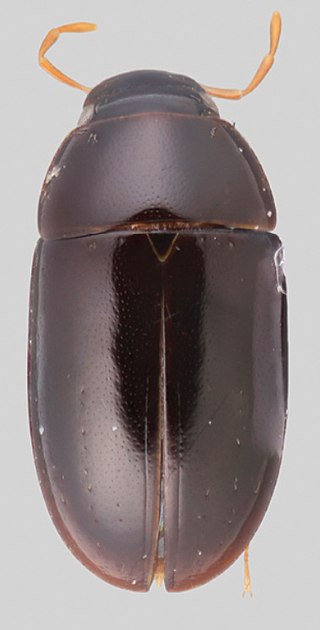
Chasmogenus is a Neotropical genus of water scavenger beetles belonging to the family Hydrophilidae.

Eumolpini is a tribe of leaf beetles in the subfamily Eumolpinae. It is the largest tribe in the subfamily, with approximately 170 genera found worldwide. Members of the tribe almost always have a longitudinal median groove on the pygidium, which possibly helps to keep the elytra locked at rest. They also generally have a subglabrous body, as well as appendiculate pretarsal claws.
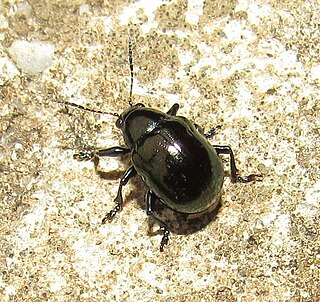
Typophorus is a genus of leaf beetles in the subfamily Eumolpinae. There are at least 52 described species in Typophorus. Similar genera include Paria and Tijucana. Typophorus itself is probably polyphyletic.
Xerolinus is a genus of darkling beetle. It consists of approximately thirty species found in the West Indies. Michael A. Ivie and Charles J. Hart named and circumscribed the genus in 2016.
Allocolaspis is a genus of leaf beetles in the subfamily Eumolpinae.
Omophron aequale is a species of ground beetle in the family Carabidae. It is distributed in East Asia.
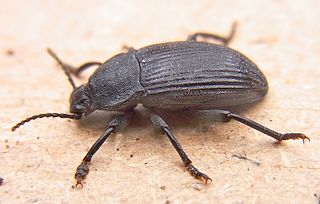
Dendarus is a genus of darkling beetles in the family Tenebrionidae. The genus is distributed from Morocco to Caucasus and exhibits a high level of diversity with 36 species, 27 of which are island endemics. Analyses of the phylogenetic relationships of 23 species from Greece and Turkey revealed 13 distinct lineages with several para- and polyphyletic cases corresponding to three major phylogroups [south/south-east Aegean ; central to north Aegean, Turkey and mainland Greece and mainland Greece ].















